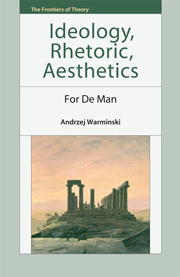Book contents
- Frontmatter
- Contents
- Series Editor's Preface
- Author's Preface
- Acknowledgements
- List of Abbreviations
- PART I Aesthetic Ideology
- PART II Hegel/Marx
- 5 Hegel/Marx: Consciousness and Life
- 6 Man and Self-Consciousness: Kojève, Romantic Ironist
- 7 Next Steps: Lukács, Jameson, Post-Dialectics
- PART III Heidegger/Derrida
- Appendix 1 A Question of an Other Order: Deflections of the Straight Man
- Appendix 2 Response to Frances Ferguson
- Index
7 - Next Steps: Lukács, Jameson, Post-Dialectics
from PART II - Hegel/Marx
Published online by Cambridge University Press: 05 October 2013
- Frontmatter
- Contents
- Series Editor's Preface
- Author's Preface
- Acknowledgements
- List of Abbreviations
- PART I Aesthetic Ideology
- PART II Hegel/Marx
- 5 Hegel/Marx: Consciousness and Life
- 6 Man and Self-Consciousness: Kojève, Romantic Ironist
- 7 Next Steps: Lukács, Jameson, Post-Dialectics
- PART III Heidegger/Derrida
- Appendix 1 A Question of an Other Order: Deflections of the Straight Man
- Appendix 2 Response to Frances Ferguson
- Index
Summary
Lukács
At the outset of “Hegel on the Sublime,” Paul de Man offers Lukács – in a list that also includes Benjamin, Althusser, and Adorno – as an example of an authentically critical aesthetic thinker who can make “the most incisive contributions to political thought and political action” precisely because of, and not in spite of, his concentration on aesthetic questions and literary texts. Such a characterization certainly makes sense, at least once we get past the platitudes of aestheticism and remember what intellectual history, “let alone actual philosophy,” will tell us: namely, that the category of the aesthetic is a principle of articulation rather than a “principle of exclusion” that is wrongly “assumed to operate between aesthetic theory and epistemological speculation, or, in a symmetrical pattern, between concern with aesthetics and concern with political issues” (AI 105–7). And the company in which Lukács is included would be equally apt. Less obvious and more suggestive, however, would be de Man's juxtaposition of Lukács with one other truly critical aesthetic thinker, namely Derrida.
Derrida's and Lukács's serving as good examples of productive political thought – because both are truly critical aesthetic thinkers – is suggestive in what it would imply about their work, especially in the context of de Man's project of a critique of the “aesthetic ideology” that characterizes the reception of Kant's and Hegel's truly critical aesthetic thought.
- Type
- Chapter
- Information
- Ideology, Rhetoric, AestheticsFor De Man, pp. 137 - 156Publisher: Edinburgh University PressPrint publication year: 2013

